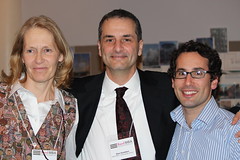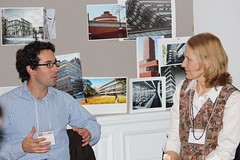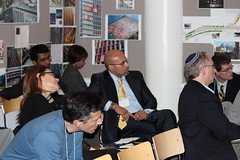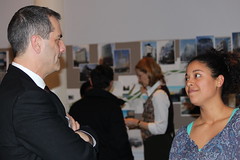 On Monday February 7th, the Bard MBA Sustainable Business Series launched in New York City. In a night following the theme of start-up businesses and innovative thinking, it was only appropriate that the LEED platinum office of Cook + Fox Architects played host for the evening’s festivities. Bob Fox, designer of the Bank of America building (the first LEED certified skyscraper), began the night by offering guests a warm welcome and explained that through creativity and innovation it is possible to make a difference in the way that we build, operate, and occupy our buildings—one of the building blocks to sustainable business.
On Monday February 7th, the Bard MBA Sustainable Business Series launched in New York City. In a night following the theme of start-up businesses and innovative thinking, it was only appropriate that the LEED platinum office of Cook + Fox Architects played host for the evening’s festivities. Bob Fox, designer of the Bank of America building (the first LEED certified skyscraper), began the night by offering guests a warm welcome and explained that through creativity and innovation it is possible to make a difference in the way that we build, operate, and occupy our buildings—one of the building blocks to sustainable business.

The night’s speakers were Jeff Hittner, a Bard MBA faculty member and founder of Ethikus and 3CS, and Sue Van Hook, Chief Mycologist at Ecovative Design. After an introduction by Bard MBA Director Eban Goodstein, the panelists explained the process behind launching and building these growing businesses and the successes that they have seen.
Starting with a pilot project in New York City’s East Village in September, Ethikus developed a web application to evaluate the stores and restaurants in the area for their environmental and socially responsible practices (things like health care for their employees, composting, and community involvement made the list). With 120 locations evaluated in the village, the next step is the scale-up across New York City. Ethikus will launch “Shop Your Values Week,” running May 3rd to 10th, where they hope to enroll 300-500 businesses in their online directory and to have 30,000 New Yorkers participate across all boroughs over the course of the week.
 Ecovative Design is a five year-old design company using ecological innovation in the form of agriculture waste and mushroom cultures as part of an inventive and holistic process to produce new materials for packaging and building. It is an idea that was started by two engineering students as part of a class project in college that has now grown into a company with a staff of 30 people. They have seen quite a bit of success, winning multiple innovation awards both nationally and internationally, and are partnering with companies like 3M, and federal agencies including NOAA. This truly cradle to cradle idea has low carbon inputs by using agriculture wastes, and products are grown over a five day period at room temperature in the dark, greatly reducing energy inputs. Plus, after the packaging is used it’s completely compostable!
Ecovative Design is a five year-old design company using ecological innovation in the form of agriculture waste and mushroom cultures as part of an inventive and holistic process to produce new materials for packaging and building. It is an idea that was started by two engineering students as part of a class project in college that has now grown into a company with a staff of 30 people. They have seen quite a bit of success, winning multiple innovation awards both nationally and internationally, and are partnering with companies like 3M, and federal agencies including NOAA. This truly cradle to cradle idea has low carbon inputs by using agriculture wastes, and products are grown over a five day period at room temperature in the dark, greatly reducing energy inputs. Plus, after the packaging is used it’s completely compostable!

Through the stories of these two new enterprises these five key lessons and insights for others looking to follow in their footsteps brought to light:
- Two initial questions to consider when starting a new enterprise: what are the challenges that you are trying to solve, and what are the underlying assumptions that you, and possibly consumers, are making?
- Collaboration and partnering are key in this space. Small groups have little or no competitive advantage, and therefore only benefit from forming networks and partnerships with other entrepreneurs and funders who also “get it.” The benefits of these collaborations are the number of people that end up involved in the process and aware of the brand. But just make sure you are picking the right partners for your business to ensure the greatest gains from collaboration!
- “A brand is not your own.” Ethical consumers have the power to create, change, and even destroy brands as exemplified by the case of Rainforest Action Network (RAN) vs. CitiBank. It only took three people working at RAN to start a consumer social movement, ultimately resulting in the creation of the Equator Principles which prevent banks from making infrastructure investments without first extensively investigating the social and environmental costs.
- Go for the awards! If you have a one of a kind idea put it out there, apply for grants, innovation competitions etc. When you have the right idea the praise and recognition will build on itself and only help to propel you further towards success.
- Celebrate your success and learn from your mistakes. There is just as much to learn from a mistake as there is from success, and sometimes it’s the mistakes that lead to bigger and better innovation.
It was a great evening highlighting some of the key points to sustainable business startups that will surely continue next week with the discussion of “Is sustainable more productive?”
–Melissa Provinsal, Bard CEP ‘12